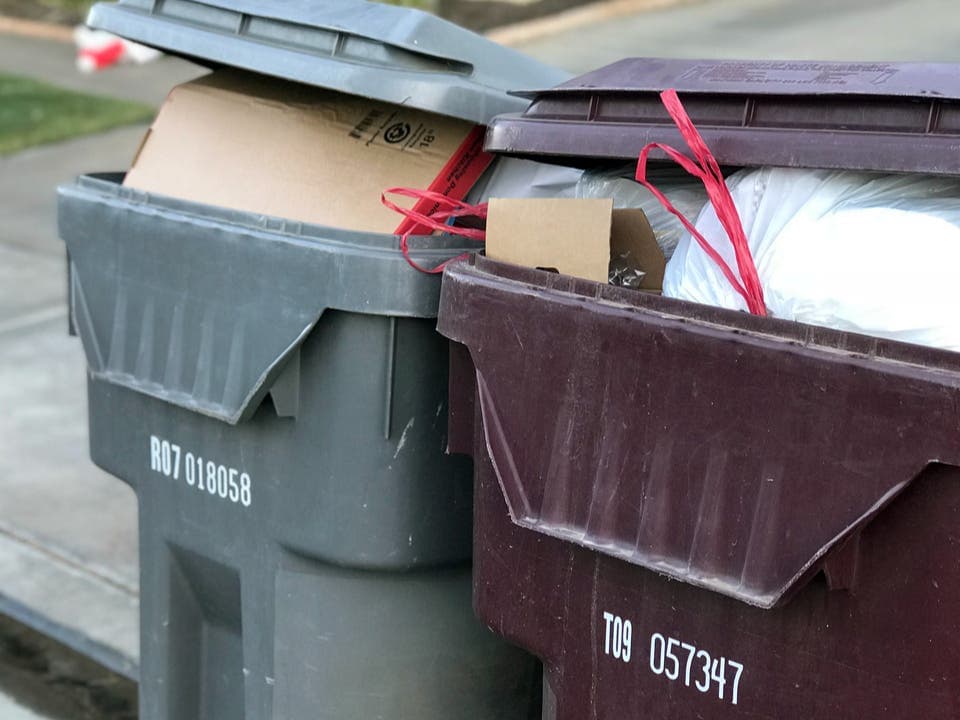'Significant Delays': 7-Day Trash Strike Sparks Frustration Across North Shore, Greater Boston

Summary
A week-long Teamsters Local 25 strike against Republic Services (RSG) has caused significant trash and recycling delays across Greater Boston, frustrating residents and municipal leaders. Mayors are advising patience amid missed pickups and overflowing bins. The union demands better wages and benefits, while RSG maintains its offers are fair. The strike poses operational and financial challenges for RSG, potentially impacting profitability and customer relations, warranting close investor monitoring.
'Significant Delays': 7-Day Trash Strike Sparks Frustration Across North Shore, Greater Boston
PEABODY, MA – July 8, 2025 – A week into the Teamsters Local 25 strike against Republic Services (NYSE: RSG), residents across the North Shore and Greater Boston are grappling with mounting trash and recycling, as collection services remain severely disrupted. While Republic Services has managed to resume some routes, the pervasive uncertainty, missed pickups, and overflowing bins in the summer heat are fueling widespread frustration among communities.
Peabody Mayor Ted Bettencourt has candidly informed his city's residents and businesses to brace for "significant delays" that are expected to persist throughout the week. "With so much uncertainty, the best information I can provide is for those who have not had their trash picked up, please leave it out curbside," Bettencourt advised. He added, "For those that have had their trash picked up, I'm told that Republic strives for a regular week this week. ... Please put your trash out on your regular pickup day, but expect delays of at least a day or two and maybe more." The Mayor acknowledged the challenging and unpredictable nature of the situation, expressing regret for the inability to provide more specific information.
Bettencourt confirmed he is actively collaborating with municipal leaders from neighboring communities, including Beverly, Danvers, Gloucester, Lynnfield, Malden, Marblehead, Swampscott, Topsfield, North Reading, Arlington, Watertown, Canton, and Wakefield, all of whom are significantly impacted by the work stoppage. Their collective goal is to facilitate a fair resolution to the dispute.
Community-Specific Impacts and Mitigation Efforts
- Beverly: City officials reported an increase in the number of trash drivers from three to five as of Tuesday. However, they noted that the new drivers' unfamiliarity with Beverly's routes has led to numerous missed streets in recent days.
- Danvers: The town announced a temporary halt to yard waste pickup this week, with the pause on bulky item collection also continuing.
- Swampscott: Residents with Monday pickups were instructed to have both trash and recycling collected on Tuesday, while Tuesday pickups were expected to proceed as scheduled.
- Lynnfield: Trash-only collection was set for Tuesday with a one-day delay, as curbside recycling is not available in the town. Lynnfield has opened a temporary emergency drop-off facility at its DPW on Summer Street for residential trash, commingled recycling, and regular yard waste, operating Monday through Friday from 7 a.m. to 3 p.m.
- Marblehead: The Board of Health urged residents experiencing missed collections to report them via email at BOHemails@marblehead.org. The town's transfer station remains open to Marblehead residents during the strike, with officials prioritizing collections for streets that have been missed.
- Malden: Regular curbside trash collection is set to resume on usual pickup days, with blue trash bags no longer required. However, curbside recycling remains paused indefinitely due to staffing shortages caused by the strike. A recycling-only drop-off site is available at the Ferryway School Parking Lot from 11 a.m. to 7 p.m., though trash is not accepted there. The DPW Yard is also not accepting trash at this time, with efforts underway to add more dumpster hours.
The Core of the Dispute
U.S. Rep. Seth Moulton met with Teamsters Local 25 President Tom Mari and striking workers in Peabody, highlighting the union's demands for improved wages, better benefits, and stronger labor protections that align with industry standards. Conversely, Republic Services has maintained that its current proposals are competitive and fair in these regards. Picket lines have been established at multiple locations, including four sites in Peabody, as well as Revere, Holbrook, Roxbury, and Quincy, underscoring the widespread nature of the labor action.
Market Implications and Investment Insights for RSG
This ongoing strike, while localized to the Greater Boston area, represents a significant operational challenge for Republic Services (RSG). Labor disputes can impact a company's profitability through increased operational costs (e.g., hiring temporary workers, overtime, logistics for alternative solutions), potential revenue loss from service disruptions, and reputational damage. For investors, this situation warrants close monitoring.
Key Considerations for Investors:
- Operational Resilience: How quickly can RSG restore full service and mitigate the backlog? The duration and intensity of the strike will directly impact the financial fallout.
- Labor Relations: The outcome of this dispute could set a precedent for future negotiations with other unions or in other regions. A prolonged or costly resolution could signal broader labor challenges for the company.
- Customer Retention: While waste management is often a contracted service, prolonged disruptions can strain customer relationships and potentially lead to contract renegotiations or, in extreme cases, loss of business.
- Financial Impact: Investors should look for any guidance updates from RSG regarding the financial impact of the strike on its Q3 or full-year earnings. Increased expenses related to the strike could compress profit margins.
- Industry Context: Labor shortages and rising wage demands are not unique to Republic Services. This strike could be indicative of broader trends within the waste management sector, affecting competitors like Waste Management (WM) as well.
While the immediate impact is regional, the situation underscores the importance of labor stability for essential service providers. Investors should assess RSG's ability to navigate these challenges and the potential for long-term implications on its operational efficiency and financial performance. The company's stock performance in the coming weeks may reflect investor confidence in its ability to resolve the dispute swiftly and effectively.